Support strong Canadian climate journalism for 2025
The leader of Canada's New Democrats chuckled when asked for his thoughts about democracy in Canada.
"I'm against it," Thomas Mulcair said, as he sat down for an interview with National Observer on a chilly but sunny Saturday morning in March.
All kidding aside, Mulcair, said he has known that democracy has been under attack for some time, and he's warning young Canadians to do something about it.
This was his message a few moments earlier as he addressed a crowd of young Quebecers gathered at a conference organized by the Quebec Community Groups Network in Gatineau.
“Democracy is fragile. Never take anything for granted. And you need to fight constantly for your rights and freedoms," Mulcair said, as he co-hosted a panel with Nick Gamache, a senior producer from the CBC's The House.
Donald Trump and Vladimir Putin aren't stable, Mulcair says
The network, an umbrella group that represents Quebec's anglophone community, organized the event for youth to develop a political roadmap for Canada's next 50 years in time for the country's 200th birthday in 2067.
Mulcair spoke about some of the more noticeable threats to democracy emerging in recent weeks with U.S. President Donald Trump's recent criticism of the courts and his description of journalists as "enemies" of the American people.
“In the world in which we live today, and I really wish we didn't have to say this but I honestly believe that we probably live in one of the more dangerous times than in the last 75 years," Mulcair said. "Things are not stable. Individuals who are in important positions are not stable, whether it’s the American president (Trump) or the Russian president (Vladimir Putin)."
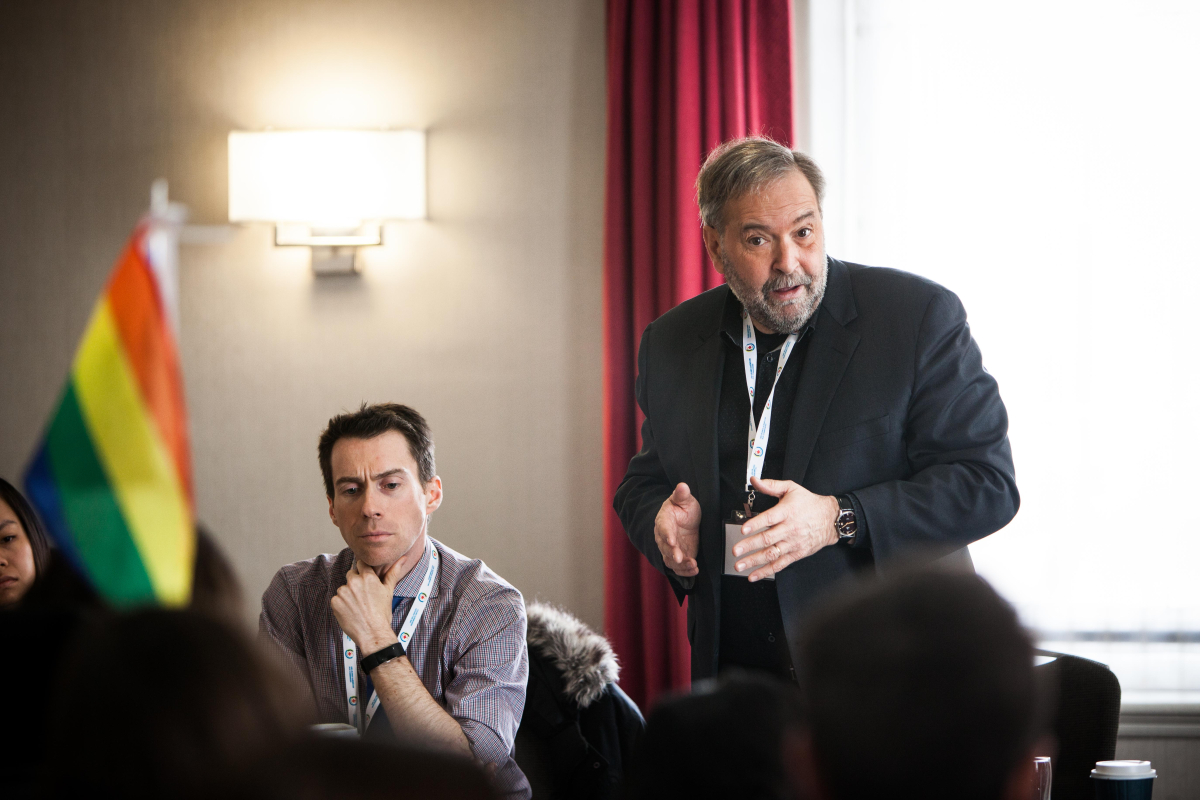
The NDP leader, who will be replaced following a leadership vote this fall, also took aim at Canada's Prime Minister Justin Trudeau, warning that the current Liberal government's trajectory, favouring new pipelines for the oil and gas industry, is at odds with promises to slash the country's greenhouse gas emissions and meet its commitments under the international Paris agreement on climate change.
Trudeau has said that his government's policies have struck a balance between protecting the environment and promoting economic growth.
Mulcair also criticized Trudeau's decision to break a promise to implement reforms to Canada's electoral system.
And the NDP leader challenged the prime minister to do more to defend Canadians who are affected by Trump's immigration, refugee and travel restrictions, drawing attention to recent cases of two Canadians, Manpreet Kooner and Yassine Aber, who happened to be visible minorities, being singled out at the U.S. border as they tried to cross in separate instances.
The following is an edited transcript of a National Observer interview with Thomas Mulcair:
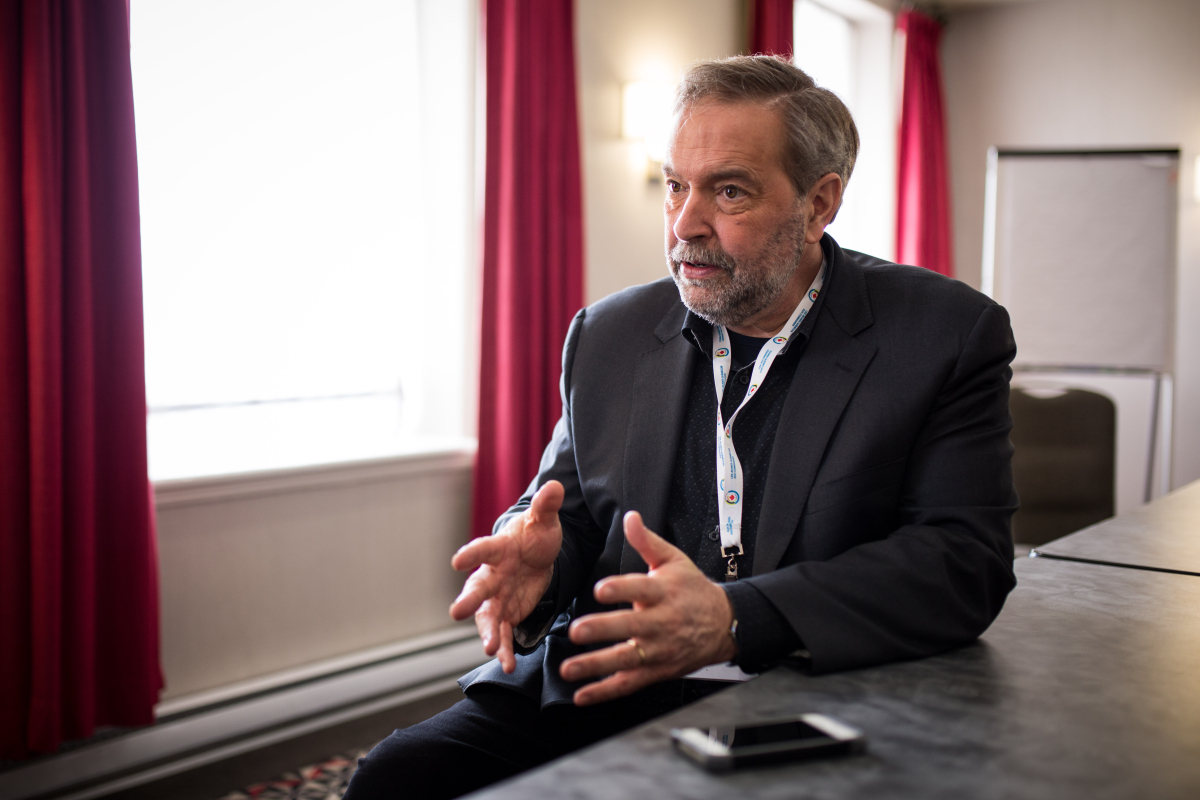
National Observer: The theme of this conference is Canada 2067 - where do you see Canada going in the next 50 years in terms of it’s democracy?
Long before Donald Trump, I talked about this many times, especially with youth groups, that they should never take democracy for granted. It’s the exception in the world to have functioning democracies, to have your rights guaranteed. It’s the exception. The general rule is they’re inconvenient for people in power and they’re done away with. So I’ve always tried to convince — especially groups of young people — and I’ve had the great pleasure through a long career, speaking to them many times (to tell them) you have to fight for this constantly. It’s something that has to be cherished, it has to be protected, it has to be taken care of, and I still believe that today. So I hope that in 2067 Canada is still a shining light, a model of a functioning, working democracy and I don't take that as a given. And that’s why I fight all the time for democracy.
How do you think politicians are doing in Canada right now?
I think that politicians in Canada, overall, all parties considered, are doing well. And we have challenges that are not new. We have challenges of keeping people engaged in the political process. We’re dealing with a generation of young people who are the most engaged, I think, in Canadian history. But they’re getting results in different ways. So the political process itself has to actualize, modernize and stay relevant for them. Otherwise, again, it’s part of what you can’t take for granted. And so I think that we have a positive obligation to stay connected to young people and get into contact with them, using other means than those that existed when I started in public life, 40 years ago.
You talked a bit about the visit (on Friday) of U.S. Secretary of Homeland Security John Kelly. Do you think the government is doing a good job of defending Canada? Can you expand on what you meant?
No. I think that the Liberal government of Mr. Trudeau has really fallen short of the mark. It’s not enough to talk about human rights internationally. You have to actually stand up and be counted and act to protect those human rights internationally, and I think that when you have young people being turned away at the border for no reason and they’re not even on the list of countries — they’re kids born in Canada. And in the case of Yassine Abert, he was told that he didn't have a Canadian passport — he had a valid Canadian passport for the next nine years. In both those cases, the case of (Manpreet) Kooner and him, there was one thing in common. They just happened to be visible minorities. And they were the ones who were singled out. They were taken for five, six hours of interrogation, fingerprinted and turned back at the Canadian border. So I find that totally unacceptable. And it’s not enough to have (Public Safety Minister) Ralph Goodale stand beside his American colleague Mr. Kelly and say 'Oh well. There must have been good reasons.' Well no, there weren’t good reasons because the only reasons that they gave, turned out to be false.
But could it harm Canada-U.S. relations though if you go too far in criticism, referring, as you just did, to the president as being unstable. Can a prime minister of Canada say those kind of things?
...It’s been a year that I’ve started saying that Donald Trump had all the hallmarks of fascist. When you attack the court system and the independence of the judiciary, outright. When you attack the free press and say that it’s the enemy of the American people. When you go after the underpinnings of your democracy, you are showing all those hallmarks, and it’s not just me who says it. It’s somebody as respected as (U.S. Sen.) John McCain, who has also said this is the slippery slope that leads to a dictatorship and he didn't use that word lightly. Nor do I. So I think that you’ve got to call a spade a spade. And Canada has been able to disagree with the United States over the years — whether it was during the Vietnam War, or in 2003 with the invasion of Iraq — and still stay good neighbours and good friends. But I think that we’ve got to stand up for the Canadians who are being affected by these decisions... Do we have a prime minister who stands up and defends Canadians? Or does he just kowtow and keel over, which is what we’ve seen unfortunately from Mr. Trudeau.
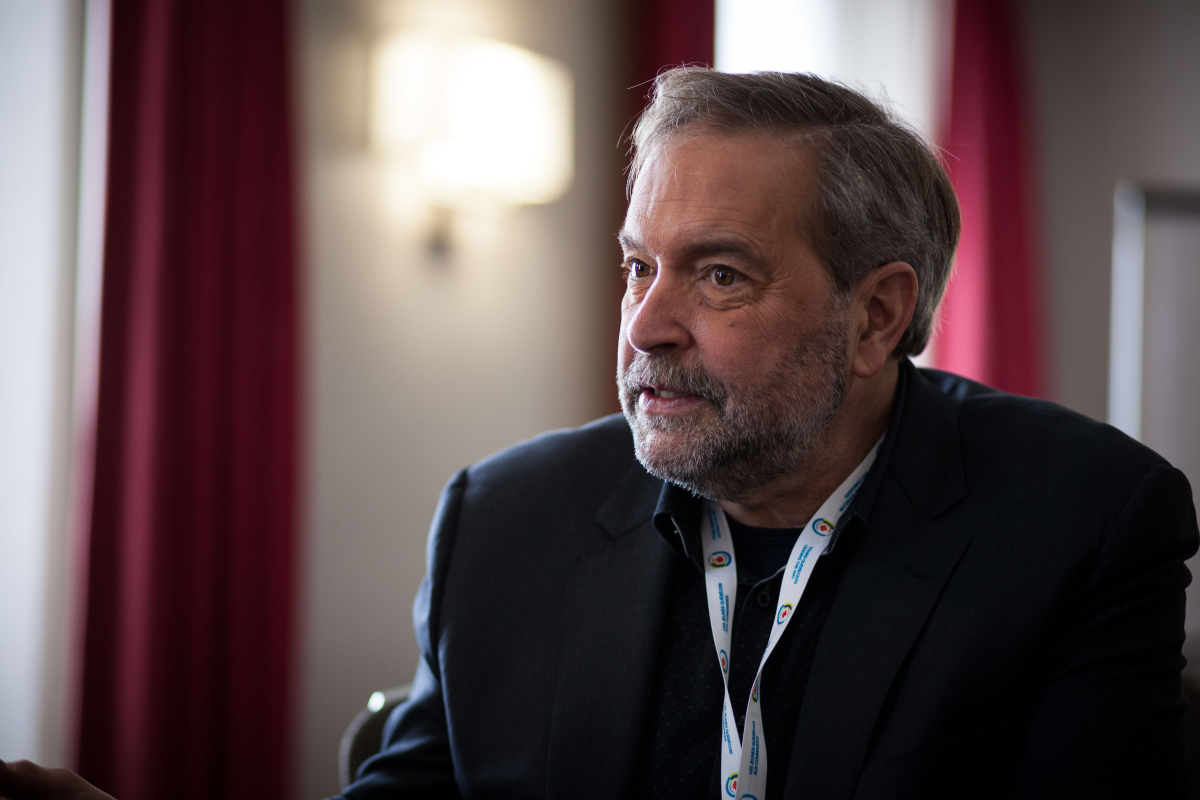
You made reference to not being entirely pleased about the message (that Trudeau) delivered in Texas or what he was doing there. What did you mean?
Well I think that it’s embarrassing that Mr. Trudeau accepted an award from oil companies and his false argument, which is a straw man set up to be knocked down, that no country would leave 175 billion barrels of oil in the ground. Well who is even saying that, other than Mr. Trudeau? What he has failed to do was to respect what he proudly announced was going to be Canada’s role in implementing the Paris accord. It is impossible for Canada to reduce greenhouse gas emissions, while the Liberals are in power... The last time the Liberals were in power, from 1993 to 2006, Canada had one of the highest increases in greenhouse gases in the world, despite having signed the Kyoto Accord (on climate change). Now with all of these new approvals (by the Trudeau government) in pipelines, it’s rigorously impossible for Canada to reduce greenhouse gas emissions. So all the rest is just rhetoric. If you’re not reducing greenhouse gas emissions, you’re not doing your part to contribute — to deal with global warming, period. So I mean, beyond the rhetoric, getting that award from the oil companies, supposedly because you’ve been able to come up with a magic formula, a sweet spot to deal with the environment and the economy, (what the government is saying) is just false. It’s not true. There is no such sweet spot in Justin Trudeau’s Canada. What he’s done is he’s opened up all of these new pipelines. He’s approved them all and Canada won’t be able to do its part.
Shell and Statoil, two foreign companies have just said they’re leaving the oilsands, so what does that tell you about the situation? Are the standards too tough? Are they saying that we can’t develop this resource safely?
No, I think the reality is quite different. And if you look at Shell’s reaction and this big Shelburne play that they have off of the East Coast of Canada which is a big gas play, and if you meet with the people of Shell, they’ll tell you that they found, especially under the Conservatives, that Canada’s regulations were simply too lax, too lenient and that it could have a negative effect on the bottom line of the company, overall. When you look at the payout that BP just had to pay for the Gulf of Mexico tragedy, you realize that it’s the very bottom line and sometimes that it’s the existence of some of these companies that can be in play with one negative event. So long term, these companies want to show that they’re doing something to reduce greenhouse gas emissions and that they’re not exploiting what are certainly the source of fossil fuels that produces the most greenhouse gases in the world.
How do you think the NDP is doing and do you have any advice to any of the leadership candidates?
Well historically 44 members is — other than the orange wave — is the high water mark for the NDP and it’s the quality of the people that we elected (in 2015) as well. We’ve got a really impressive group of people in Parliament who are leading a very tough fight. Because, of course, there was (so much) good will towards this new government (from members of the public who were happy) that it finally got rid of the Harper Conservatives, it was hard to get people to reflect on what they were actually doing as opposed to what they were saying, and the image and the brand. I was there. I was standing right there in the hall in Paris, when Mr. Trudeau threw out his arms wide and said, 'Canada is back.' So everybody thought that meant that Canada would actually have a plan to reduce greenhouse gases. We don’t. We’re not doing it. No more than we did it the last time Liberals were here (in government) but Canadians feel a lot better about Justin Trudeau not doing anything about greenhouse gases than they felt about Stephen Harper not doing anything about greenhouse gases. And the equation is so real that the only plan that Justin Trudeau has is Stephen Harper’s plan. And he won't be able to meet Stephen Harper’s plan. They use 2005 as a reference instead of 1990; their targets are hopelessly inadequate and that’s what we’ve got. So it’s tough, because you’re dealing with a (Trudeau) brand that is much more attractive (than Harper). But the substance of it — Canadians are starting to realize — with the fundamental broken promise on democratic reform and a lot of others that have been added into that pile — after a year and a half of Justin Trudeau, people are starting to say: ‘Ok can we actually look at what they’re doing, as opposed to the image and the brand of what they say they’re doing?’ That’s starting to take place and it’s going to take a little bit more time. But slowly but surely, people realize that there is a lot of image and there is a lot of branding, but there’s a lot less substance.
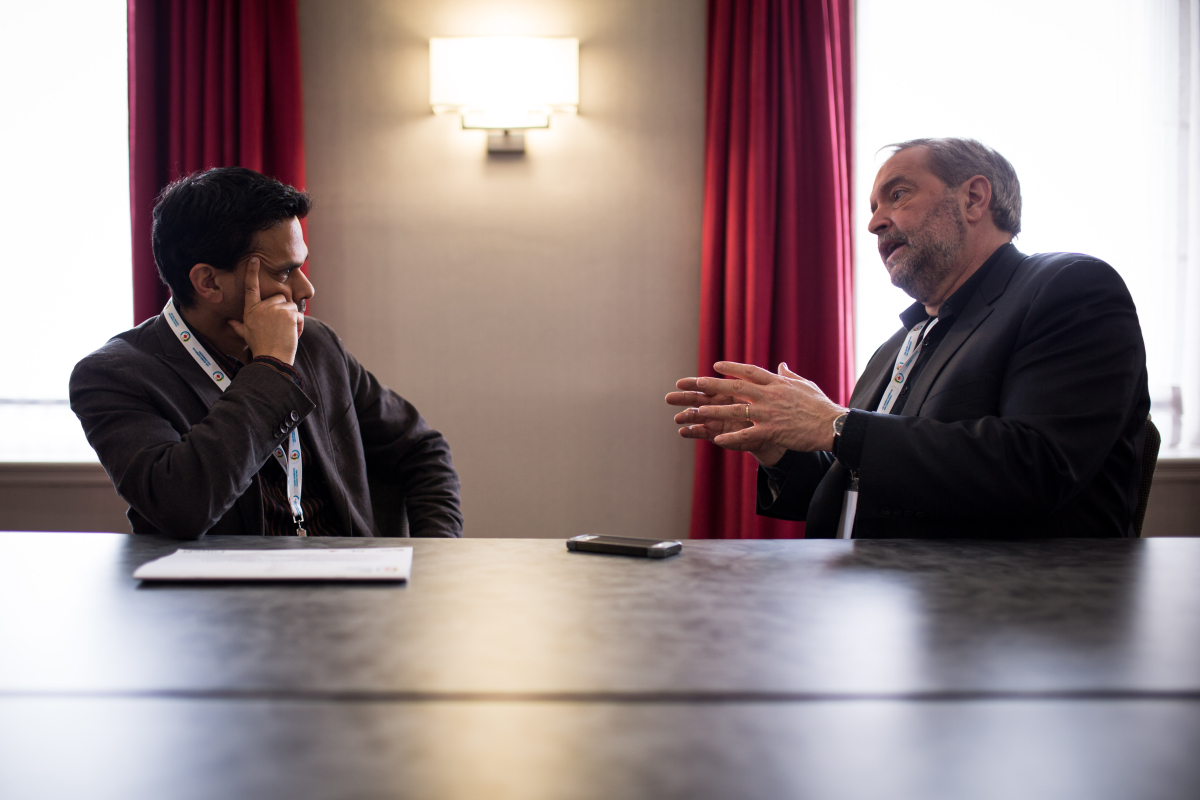

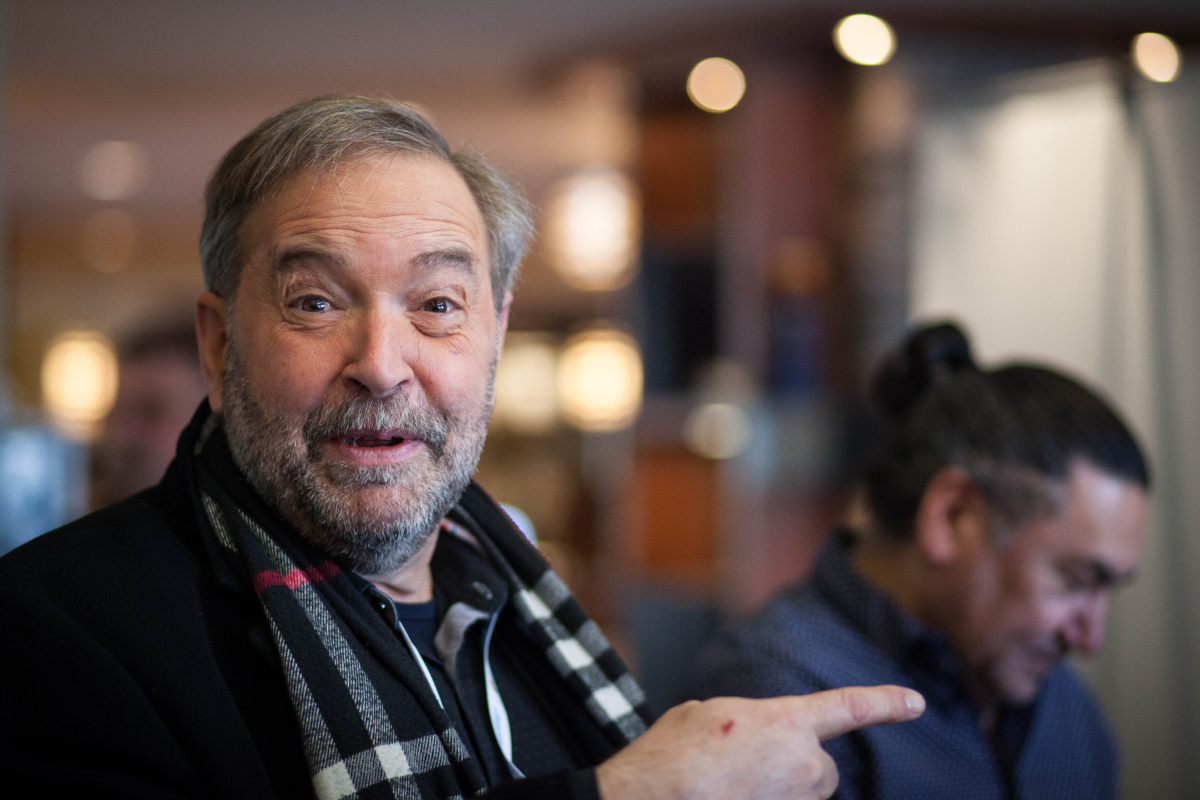


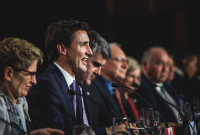
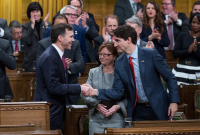
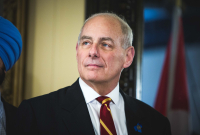
Comments
Mr. Mulcair boldly states that the Canadian democracy is fragile, under threat, and must be fought for.
"Democracy" is pretty important, right? That's one of the big ones, yes? And Mr. Mulcair is sounding the alarm, right? But nowhere--that I could find--in his comments does Mr. Mulcair give us his ideas on what threatens the Canadian democracy. (Oh, he does vaguely mention Trump and Putin in the context of his comments on democracy. Convenient boogiemen but that's all.)
With respect to fighting for the fragile democracy, what specifically are Mr. Mulcair's recommendations to our young people? (And what about us old folks?)
Mr. Mulcair and his fellow NDs are woefully irrelevant given this appalling ignorance. Providing a thin gruel of cliche where hard analysis of our political economy is needed, hardly differentiates the NDs from the failed US Democratic Party establishment. It's as if Mr. Mulcair's platform for the NDs is "Vote for us, because we are not Trump and Putin."
I would love for Mr. De Souza to pursue a follow up interview that pushed Mr. Mulcair to go beyond Trump and Putin on the nature of the threats to our democracy.
Mr. Mulcair boldly states that the Canadian democracy is fragile, under threat, and must be fought for.
"Democracy" is pretty important, right? That's one of the big ones, yes? And Mr. Mulcair is sounding the alarm, right? But nowhere--that I could find--in his comments does Mr. Mulcair give us his ideas on what threatens the Canadian democracy. Oh, he does mention Trump and Putin--they are "unstable," i.e., crazy. So that's the extent of his analysis on the threats to our democracy?
With respect to fighting for the fragile democracy, what specifically are Mr. Mulcair's recommendations or even vague thoughts beyond the realm of effete cliche?
Mr. Mulcair and his fellow NDs are woefully irrelevant given this appalling love affair with cliche and blame of Trump and Putin. Mr. Mulcair's thin gruel of cliche where hard analysis of our political economy is needed, hardly differentiates the NDs from the failed US Democratic Party establishment. It's as if Mr. Mulcair's platform for the NDs is "Vote for us, because we are not Trump and Putin."
I would love it if Mr. De Souza would pursue a follow up interview that pushed Mr. Mulcair to go beyond Trump and Putin on the nature of the threats to our democracy.
Democracy doesn't work unless the people do. It may just be as simple as that. If we turn our nose up at politics, make vague sweeping generalizations about 'all politicians being the same', or just fail to pay attention enough to notice the difference between rhetoric and action (something Mulcair calls Justing Trudeau on, and for the most part rightly so), than pretty soon we have democracy in name only........
oligarchy in fact.
Recent news about the large sums of money Kindermorgan donated to the Liberal party of British Columbia is a case in point. If democracy can be bought.........if parties have to rely on petro donors to run their programs, than in what sense can we call that democracy? Yes...its cheap for the average Canadian....but it isn't democracy.
It takes an actual social democrat to point out that you can't have your cake and eat it too...get an award from Oil and Gas companies, give the green light to tarsands pipelines, and meet your Paris commitments.
This should be obvious to practcing democrats....for whom 'math is not that hard'.......but its easy for people dependent on the Petro dollar to want to buy the rhetoric.....and praise the inaction.
But climate leaders do not build pipelines. Not in this time. Not with what we now know about climate change and how fast its bearing down on us. Good for Tom Mulcair to make that fact explicit. It may be too bad for some of us who bet the farm on another 100 years of bitumen extraction, but its the truth.
Real politicians are going to say it. Real democrats expect that from their representatives. Anything less is the slppery slope...and it doesn't just lead to Donald Trump and his bald faced lies....its greased with spills and environmental disasters from sea to thrreatened sea.
Major Tom